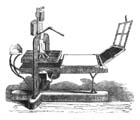Verses on our Excellent Constitution
I.
Come Britons unite, and in one common cause,
Stand up in defence of King, Liberty, Laws;
And rejoice that we've got such a good Constitution,
And down with the barbarous French Revolution.
II.
There's Marat, Egalite, and the famous Tom Paine,
Had best stay where they are, and not come here to reign:
Be staunch for your King and your good Constitution,
And down with their barbarous French Revolution.
III.
The French call us now a province of France,
But we'll soon let 'em know we can learn 'em to dance.
Come, rejoice that we've got such a good Constitution,
And down with the barbarous French Revolution.
IV.
Tom Paine he would fain set us wrangling together,
That his friends o'er the water may seize us at pleasure;
Don't let him teaze us, nor our good Constitution,
But down with the barbarous French Revolution.
V.
We're taxed, he says, by our merciful King,
But that's to ourselves, and nothing to him.
May he gloriously reign, and our good Constitution,
And down with the barbarous French Revolution.
VI.
Our soldiers are honest, brave, loyal, and true,
For the blood of their King their own they would rue:
They'd stand firm in the cause of our good Constitution,
And down with the barbarous French Revolution.
[The Author of the above is a Youth only Twelve Years of Age.]
